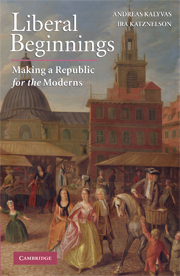Book contents
- Frontmatter
- Contents
- Acknowledgments
- 1 Beginnings
- 2 The Rhetoric of the Market: Adam Smith on Recognition, Speech, and Exchange
- 3 Agonistic Liberalism: Adam Ferguson on Modern Commercial Society and the Limits of Classical Republicanism
- 4 After the King: Thomas Paine's and James Madison's Institutional Liberalism
- 5 Embracing Liberalism: Germaine de Staël's Farewell to Republicanism
- 6 On the Liberty of the Moderns: Benjamin Constant and the Discovery of an Immanent Liberalism
- 7 After Republicanism: A Coda
- Index
- References
7 - After Republicanism: A Coda
Published online by Cambridge University Press: 05 September 2012
- Frontmatter
- Contents
- Acknowledgments
- 1 Beginnings
- 2 The Rhetoric of the Market: Adam Smith on Recognition, Speech, and Exchange
- 3 Agonistic Liberalism: Adam Ferguson on Modern Commercial Society and the Limits of Classical Republicanism
- 4 After the King: Thomas Paine's and James Madison's Institutional Liberalism
- 5 Embracing Liberalism: Germaine de Staël's Farewell to Republicanism
- 6 On the Liberty of the Moderns: Benjamin Constant and the Discovery of an Immanent Liberalism
- 7 After Republicanism: A Coda
- Index
- References
Summary
Thus, a new political liberalism was born, as three generations of seminal thinkers transformed the world of political ideas. Despite their continuing, if uneven, faithfulness to the founding principles of republicanism, their innovative writings brought its distinctive intellectual and political identity to an end.
Of course, this dynamic movement in political philosophy had diverse features and took a variety of paths. Our primary goal, notwithstanding, has been to understand how Smith, Ferguson, Paine, Madison, Staël, and Constant partook in a common project. Crossing national, linguistic, and regional boundaries, as well as philosophical and political borders, they shared a way of thinking, reasoning, and imagining about politics for modern times. They drew from within on republican resources, and, aware of the limitations of these ideas in dealing with novel conditions, also were receptive to currents that presently are associated with the long history of liberal development.
Their method was predominantly historical. Rather than think abstractly in the manner of social contract philosophers, who begin with hypothetical circumstances of nature outside of time and place, and rather than contemplate transcendentally in the manner of natural-law theorists, who wish to establish on earth norms that hover outside and prior to human experience, they emplaced their ideas in a concrete lineage and sequence of time. As social analysts, they wished to identify arrangements, mechanisms, and causes that were specific to the circumstances they observed and analyzed, and within which they wrestled.
- Type
- Chapter
- Information
- Liberal BeginningsMaking a Republic for the Moderns, pp. 176 - 182Publisher: Cambridge University PressPrint publication year: 2008



